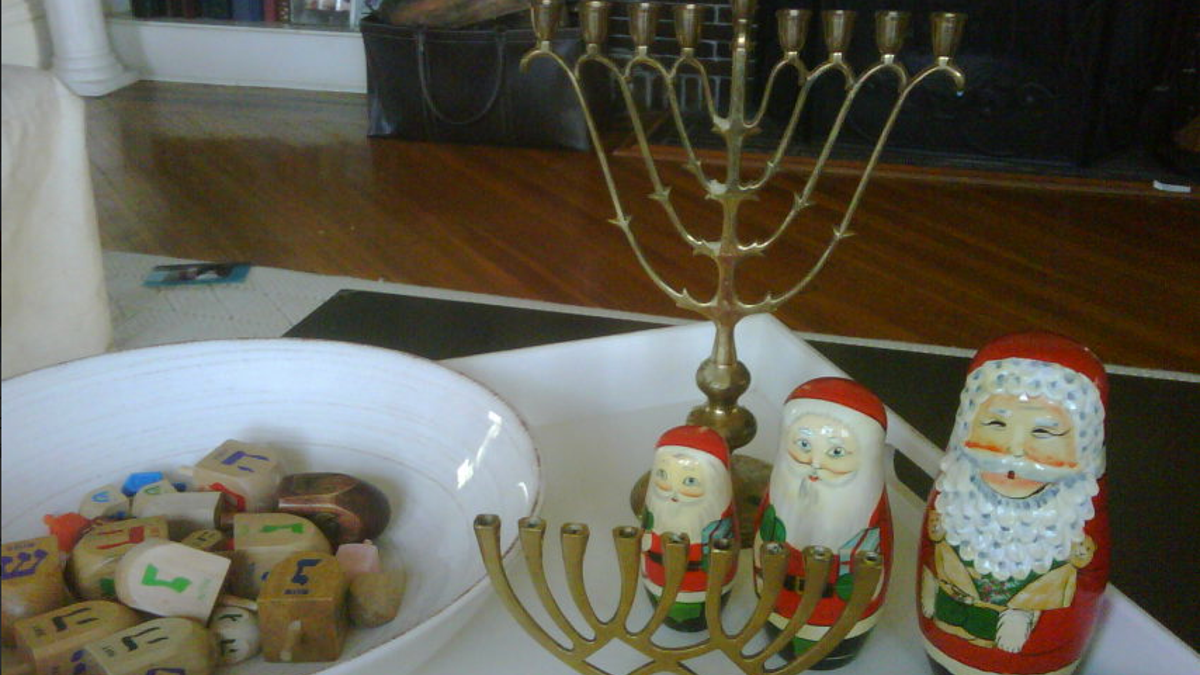
Honoring Christmas and Hanukkah traditions at home. (Brooke Lefferts)
My mother is Jewish; my father was Episcopalian. For a kid, it was the best of both worlds: My family observed all cultural holidays, but I had no religious education whatsoever.
As an adult, I felt a bit cheated.
Not only do I know nada about the Bible, I often feel lost during religious services because I have no frame of reference. As a child, it was cool to get presents for Hannukah and Christmas, and search for the hidden Passover matzoh and hunt for Easter eggs.
In my 20’s, I decided I wanted a bit of religion in my life and felt most comfortable with Jewish traditions. I slowly began to learn about half of my religious heritage by attending services a few times a year and celebrating holidays with more observant friends.
My husband grew up as a conservative Jew and became a bar mitzvah, so he knows his prayers and religious background. When we married, we made a conscious decision to raise our kids (now 13, 10, and 8) with a Jewish education.
I’ve never wavered on that choice -- in fact, I’ve never felt more certain it was right than when my oldest son, Jacob, became a bar mitzvah this year. Our boys' Hebrew school experience has helped them build a sense of self, and enriched their lives in ways they can't appreciate now, but will understand more as they mature.
They’re learning the history of our religion and people, and taking pride in their Jewish identity. While I'd like to think I could have taught my kids to perform "tzedakah," which translates to "righteous behavior" and charitable giving, I know they're getting that message every week at Hebrew school.
They're part of a community -- something larger than themselves -- which gives them a sense of belonging, and will help them understand their place in the world.
When I hear them reciting Hebrew prayers in synagogue, singing Jewish songs, or excited about doing good deeds, I envy them.
I feel good about our choice to honor Jewish traditions. But every year around this time, a wave of nostalgia sweeps over me and I miss Christmas.
My father was a bit of a Christmas junkie. He made a big deal about buying the best tree -- had to be a Douglas Fir-- and although I hated standing in the cold picking it out, I loved the smell of the pine needles that took over our car and apartment.
Decorating the tree was a ceremonial experience. As Andy Williams crooned Christmas songs in the background, my parents argued over lights and ornament placement. My dad wore plaid pants and a turtleneck, and we drank eggnog with cinnamon as we worked.
My parents often hosted a holiday party with honey-baked ham and a variety of homemade cookies my mother baked with care. On Christmas morning, all our presents from Santa were unwrapped and creatively displayed in our living room, our stockings filled with candy and trinkets. My brother and I were always thrilled to discover that Santa and the reindeer had eaten the cookies and sugar cubes we left them.
My husband doesn't feel comfortable having a tree in our home, but I make up for it in my own way. Holiday lights twinkle around our windows and some of my childhood Christmas decorations nestle closely to the dozen menorahs and the kids' homemade Stars of David we've collected over the years.
Every year around this time, my boys help me decorate dozens of cookies, and we spend an evening shopping and wrapping presents for a needy local family who can’t afford them.
On Christmas Eve, we drive to Manhattan to see the Rockefeller Center tree and the retail windows on Fifth Avenue. And, on Christmas Day, we go to the Knicks game and hot dogs replace honey-baked ham.
I’m not the only one who sees Christmas as a cultural holiday more than a religious event. A recent Associated Press story suggests that for many Americans, Christmas has become a nonsectarian experience. According to a Pew Research Center poll out this week, one-third of the respondents said they considered Christmas a cultural celebration, focused on spending time with family and exchanging gifts.
While two-thirds of seniors consider Christmas religious, only 40 percent of adults under age 30 agree. Eight-in-10 non-Christians will mark the holiday, but mostly as a cultural occasion. A separate Pew poll discovered that about a-third of U.S. Jews had a Christmas tree at home last year, according to the AP story.
For a few years I mourned for my old, conventional Christmas traditions. But my boys love the holiday, so I’ve embraced it too, even if we don’t mark it the way I did as a kid.
Celebrating Christmas has never been about religion for my family.
I've realized it doesn’t matter if it’s hanging ornaments or cheering a slam-dunk -- traditions are about being together and sharing an experience. I hope my kids look back on all their childhood traditions with the same fondness I feel for mine.
Brooke Lefferts is a writer and editor. Follow her at carpoolcandy.com, and on Twitter @carpoolcandy








































